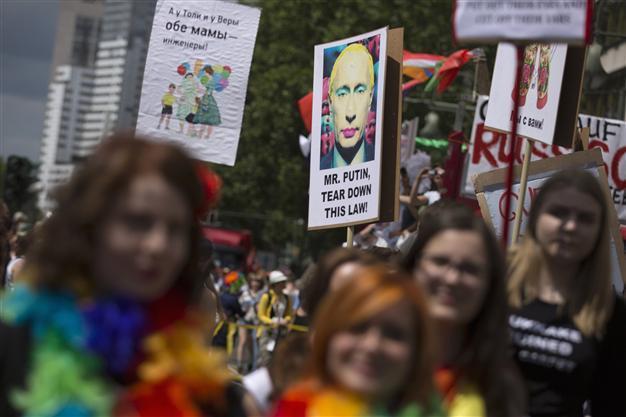Russian upper house approves 'anti-gay propaganda' bill
MOSCOW - Agence France-Presse

People carry posters denouncing Russia's policies on homosexuality at the Christopher Street Day (CSD) parade in Berlin, June 22, 2013. REUTERS photo
Russia's upper house of parliament on Wednesday passed a controversial bill banning the distribution of so-called "gay propaganda" to minors, which critics have said will be used to justify homophobic actions and arbitrary prosecution of gays.
Lawmakers in the Federation Council, the last stop before a bill is signed into law by the president, approved the measure by 137 votes with one abstention after months of protests and calls from foreign governments urging Russia not to pass the legislation. The law will "ensure informational safety of minors from propaganda... that negatively impacts a child's character," said senator Lyudmila Bokova, who introduced the bill and urged everyone to approve it. "Information propaganda of non-traditional sexual relations will be prohibited," she said. No debate followed. The house also Wednesday approved a bill banning adoption of Russian orphans by gay couples abroad or unmarried individuals in countries where same-sex unions are legal.
The lower chamber of parliament had already approved the "gay propaganda" bill with an overwhelming majority in the final reading on June 11.
President Vladimir Putin has vowed to sign the bill and on Tuesday denied that it would violate anyone's rights, calling gays and lesbians "full members of our society".
"We are not talking about sanctions for homosexuality or for... you know what I mean," he said during a conference in Finland, drawing cackles from the audience. "We are talking about protecting children from the respective information." "We ask that (other countries) do not interfere in our regulation," he added. Gay activists have blasted the bill as discriminatory, with some critics such as opposition journalist Yelena Kostychenko -- who has organised LGBT (lesbian, gay, bisexual and transgender) pickets -- calling it the "onset of fascism" in Russia.
The controversial measure bans "propaganda of non-traditional sexual relations" to minors by Russians and foreigners as well as media organisations.
It makes it an offence to say that gay relationships are equal to heterosexual ones.
If individuals use media or the Internet for such "propaganda" they can be fined up to 100,000 rubles ($3,000), while organisations can be fined up to one million rubles and shut down for up to 90 days.
The bill also targets foreigners and says foreign nationals who use media or the Internet for propaganda can be fined up to 100,000 rubles, held in police cells for up to 15 days and be deported.
Western countries and rights groups have called on Russia to drop the bill and gay pride activists protested during Putin's visit to the Netherlands in April.
The US State Department flagged the bill, which has already been adopted into law in several Russian regions, in its 2013 human rights report.
German Foreign Minister Guido Westerwelle said earlier this month that he was "very worried" about the bill and hoped that Russia will "still call this decision off".
Human Rights Watch last week sent a letter to the International Olympic Committee saying the "homophobic" draft law is "clearly incompatible with the Olympic Charter" ahead of the Winter Olympic Games in the Russian resort city of Sochi in 2014.
In typical fast-track fashion, senators additionally approved on Wednesday controversial bills imposing jail terms of up to three years on people who offend religious believers.
They also approved new measures that would block suspected pirated video content without a formal court hearing, which Google has called a "time-bomb" for the entire Internet industry.
